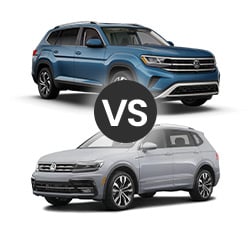2021 Volkswagen Atlas vs Tiguan
If you’re in the market for a new SUV, don’t overlook Volkswagen's current lineup. The 2021 Volkswagen Atlas ranks among the top large crossovers on the market. Families will enjoy its supreme comfort and recently updated styling. For car shoppers that need a smaller and more affordable model, VW offers the 2021 Volkswagen Tiguan. In this head-to-head comparison, we’ll examine each vehicle’s key attributes.
Size and Styling
Shoppers looking for a spacious SUV can now turn to the 2021 Volkswagen Atlas: 15 inches longer and several inches taller than its sibling, the Tiguan. But at 4,400 pounds it's also considerably heavier - making this car best suited to those with ample garage space or wide-open roads. For city dwellers who prioritize maneuverability in tight spaces over size, however? The smaller yet still capable Tiguan is likely your go-to ride.
For 2021, the Atlas receives a styling refresh. Its front fascia now looks a bit bolder, which features new headlights and a wider grille. Updated rear-end styling also helps the Atlas to stand out more. Drivers seeking a sportier look will be interested in the Atlas R-line trims. They feature black alloy wheels and racier exterior treatments.
The Tiguan is the perfect SUV for drivers who want to stand out from the crowd. With optional R-Line models and a range of LED lighting, this vehicle can make quite an impression as you cruise down the highway. If extra seating is desired, many trims offer up three rows with plenty of room for kids or other passengers alike; it's no wonder why so many have flocked towards its larger sibling, Atlas.
Families looking for a vehicle that offers plenty of passenger and storage space will love the Tiguan or the Atlas. The former provides 38.7 inches in second row legroom, whereas those who prefer to take advantage of all three rows may opt for additional 5.8 inches found in the third-row seating area on an Atlas SUV - enough room even for adults! With 37.6 cubic feet behind its rear seats, as well as 55.5 cubic feet when folded flat; both SUVs are equipped with ample cargo capacity ideal from every family adventure or outing.
The Tiguan and Atlas, according to car reviewers, offer expansive views of the outside world. Their generous side windows provide a clear view behind with minimal blind spots while their wide windshields make for an unobstructed look forward. Drivers can feel safe knowing that they have reliable visibility all around them when on the road.
Drivability
The 2021 Volkswagen Atlas has two available engines. Most buyers choose the base turbo four-cylinder engine, which returns the best fuel economy. VW rates this engine to crank out 235 horsepower and a useful 258 lb-ft of torque. A brawny V6 engine with 276 horsepower is optional. All trims feature an eight-speed automatic gearbox.
The 2021 Volkswagen Tiguan has just one engine option to choose from, but it packs a punch. Its potent turbo four-cylinder churns out 184 hp and 221 lb-ft of torque for excellent low-end responsiveness - with the 0–60 mph time clocking in at about 7.3 seconds – plus great passing performance when you need that extra shove of power. Plus, its eight-speed automatic transmission ensures smooth transitions between gears whether you're cruising or on your way to tow something heavy.
Don’t expect the Tiguan to feel as muscular. This SUV is not built to offer rapid acceleration. It posted a 0-60 mph time of 8.8 seconds. While the Tiguan packs enough performance for daily commuting, many of today’s competitors are quicker.
Unsurprisingly, the lighter and less powerful Tiguan returns the best fuel economy. According to the EPA’s calculations, it will deliver up to 23 mpg town/27 mpg freeway. AWD-equipped trims return 21 mpg town/27 mpg freeway. Regular unleaded gasoline is the suggested fuel type.
Fuel economy ratings for the full-size Atlas are lower. Owners can anticipate getting up to 21 mpg town/24 mpg freeway. Meanwhile, the V6-powered Atlas delivers up to 17 mpg town/23 mpg freeway. Luckily, premium gasoline is not needed for optimum performance.
The Volkswagen Tiguan offers an effortless driving experience with precise steering and a tight turning radius, making city streets easier to navigate. Test drivers have reported that the Atlas also handles curves well for its size - but parking in confined spaces can be tricky.
Both vehicles offer a good ride. Their European-tuned suspensions enable you to enjoy good body control without giving up any comfort. With that said, the Tiguan’s highway ride is just a bit firmer. In terms of interior quietness, these crossover SUVs are evenly matched. Next to no road noise is heard on most surfaces. Wind noise is also kept at bay.
From a standpoint of reliability, the Tiguan receives an above-average rating. Meanwhile, expect the Atlas to offer average long-term reliability. VW covers both of these models with a 50,000-mile powertrain warranty.
Comfort, Options, and Performance
Automotive journalists praise the Atlas for its impressive interior quality. It feels like a luxury vehicle. While cloth upholstery comes standard, buyers can upgrade to either VW’s V-Tex material or leather. Despite being thousands of dollars less expensive, the Tiguan doesn’t sacrifice much quality. Every aspect of its cabin is well-built.
When checking out the new Tiguan, potential buyers will have access to some nice creature comforts. Dual-zone temperature control and front-seat heating are offered on the higher trim levels. A panoramic sunroof is also on the Tiguan’s list of options. Remember, ventilated front seats and heated second-row seats are only offered on the Atlas.
The Tiguan boasts modern in-vehicle technology. A 6.5-inch touch display comes standard. Drivers will be able to quickly link their smartphone via Apple CarPlay or Android Auto. Buyers can upgrade to a larger 8.0-inch touchscreen with GPS navigation. Another highly recommended upgrade is VW’s Digital Cockpit gauge cluster, which can display colorful road maps. Other notable options consists of a wireless smartphone charger, a Fender premium sound system, and a motion-activated liftgate. In regard to technology, the Atlas offers a similar list of features.
With a starting MSRP of $25,245, the Tiguan will better satisfy drivers who are on a budget. Prices for the new Atlas start at a steeper $31,545. Drivers who want the range-topping Tiguan SEL Premium R-Line 4Motion can expect to shell a tad more than $39,000. Meanwhile, VW lists the top-of-the-line Atlas with an MSRP of over $50,000.
To avoid overpaying on a new car, shop prices online first. Get up front pricing before you walk into a dealership. We recommend the following free services; Car Clearance Deals, NADAguides, CarsDirect & & Motortrend.
These free services will offer you the lowest prices and supply you with multiple competing price quotes. You will know the best price before you visit the dealer.
Safety
The 2021 Volkswagen Tiguan and Atlas were both designed with safety as a priority, receiving great crash scores from the IIHS. For added visibility at night, drivers can opt for LED adaptive headlights in the former vehicle. Meanwhile, its counterpart has earned top marks according to NHTSA standards; boasting an impressive 5-star overall rating.
Outfitted with the latest technology for added security, these SUVs feature essential safety systems and smart options such as cruise control, parking sensors and lane-keep assist. But that's not all! The Atlas takes it one step further by offering hands-free parallel park assist - perfect for navigating cramped urban areas with ease. Enjoy unparalleled peace of mind while behind the wheel every time you go out.
Which Model to Choose?
When it comes to overall performance, the 2021 Volkswagen Atlas edges out the 2021 Volkswagen Tiguan. It offers quicker acceleration and packs more muscle for towing. On the other hand, drivers seeking the best fuel economy will lean more towards the Tiguan. Both SUVs offer good ride comfort on the open highway.
For families looking for a reliable off-road vehicle, the VW Atlas and Tiguan are both great options. Both SUVs offer good traction in slippery conditions thanks to Volkswagen's 4MOTION AWD system - perfect for camping trips or weekend getaways! The Atlas offers more space with its third row seating as well as ventilated front seats plus heated second rows; however even five passengers can fit comfortably inside the Tiguan which also comes equipped with spacious cargo capacity and plenty of standard features.
With the 2021 Volkswagen Atlas and Tiguan, buyers have two great SUVs to choose from for their lifestyle needs. For those needing extra room or enhanced hauling abilities, the Atlas is a top choice - but if you're looking for an affordable option with slightly fewer features, then don't overlook what the Tiguan has to offer.

Get up to 4 local dealers to compete for your business by offering free, competitive pricing. Know before you go to the dealer.
Every dealer offers a secret price. Find yours here.
• 2021 Volkswagen Atlas VS Audi Q7
• 2021 Volkswagen Atlas VS Ford Explorer
• 2021 Volkswagen Atlas VS Honda Pilot
• 2021 Volkswagen Atlas VS Kia Telluride
• 2021 Volkswagen Atlas VS Subaru Ascent
• 2021 Volkswagen Atlas VS Toyota Highlander


